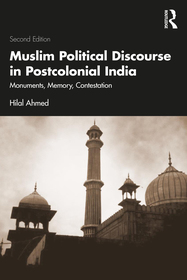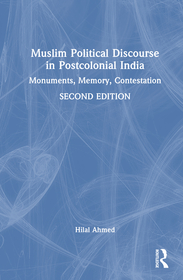
Muslim Political Discourse in Postcolonial India
Monuments, Memory, Contestation
- Publisher's listprice GBP 36.99
-
17 671 Ft (16 830 Ft + 5% VAT)
The price is estimated because at the time of ordering we do not know what conversion rates will apply to HUF / product currency when the book arrives. In case HUF is weaker, the price increases slightly, in case HUF is stronger, the price goes lower slightly.
- Discount 10% (cc. 1 767 Ft off)
- Discounted price 15 904 Ft (15 147 Ft + 5% VAT)
Subcribe now and take benefit of a favourable price.
Subscribe
17 671 Ft

Availability
Not yet published.
Why don't you give exact delivery time?
Delivery time is estimated on our previous experiences. We give estimations only, because we order from outside Hungary, and the delivery time mainly depends on how quickly the publisher supplies the book. Faster or slower deliveries both happen, but we do our best to supply as quickly as possible.
Product details:
- Edition number 2
- Publisher Routledge India
- Date of Publication 30 December 2025
- ISBN 9781032849836
- Binding Paperback
- No. of pages308 pages
- Size 234x156 mm
- Language English
- Illustrations 31 Illustrations, black & white; 18 Halftones, black & white; 13 Line drawings, black & white; 6 Tables, black & white 700
Categories
Short description:
This book explores the process of monumentalisation of Indo-Islamic historical places and their remaking as political sites in contemporary India situating these within the Muslim political discourse.
MoreLong description:
This book explores the process of monumentalisation of Indo-Islamic historical places and their remaking as political sites in contemporary India situating these within the Muslim political discourse.
It studies the process through which various monuments such as the Jama Masjid in Delhi and the Babri Masjid in Ayodhya became ‘political sites’ many decades after independence and the modes by which a memory of a royal Muslim past was articulated for political mobilisation. It analyses the histories of these archaeological monuments, their function, their status as living memories and as heritage, emerging Muslim religiosities and the internal configurations of Muslim politics in India. This new edition also explores the aftermath of the Supreme Court verdict of the Babri Masjid-Ram Janmabhoomi land title dispute and the Hindutva politics of heritage.
Raising critical questions such as whether Muslim responses to political questions are homogenous, the book will greatly interest researchers and students of political science, modern Indian history, sociology, as well as the general reader interested in contemporary India.
‘Hilal Ahmed’s book is a pioneering exploration of the politics of historical monuments, an interdisciplinary work linking the analysis of law, history and politics. It offers a remarkable analysis of the ways in which reinterpreted images of the past work as resources for mobilization and action in the political present. The book also offers a fascinating analysis of the politics around the Jama Masjid in Delhi – showing how religious monuments transform into sites of the political public sphere. Ahmed provides an insightful examination of the construction of historical memory and a sophisticated exploration of the complex effects of democratic mobilization on the political identity of Indian Muslims.’
—Sudipta Kaviraj, Professor of Indian Politics and Intellectual History, Middle Eastern, South Asian and African Studies, Columbia University, New York, USA
‘What could be more concrete, more singular in meaning than a building? In fact, many different actors have made signage, use, disputation, and rituals have made India’s built past centrally important in defining nationalism and belonging. Citizens absorb the assumptions of national identities as wholly natural, and the historical meanings attached to sites and buildings are part of those identities. Hilal Ahmed’s book provides a fresh and original analysis to understanding cultural and political life in India’s culturally plural society today.’
—Barbara Metcalf, Professor of History Emerita, University of California, Davis, USA
‘Hilal Ahmed analyses the way in which political groups, both Hindu and Muslim, have used the great monuments of the Indo-Islamic tradition for political mobilisation. His book is one of the most important and innovative pieces of research of recent times. No scholar in the field should ignore it.’
—Francis Robinson, Professor of the History of South Asia, Royal Holloway, University of London, UK
Table of Contents:
List of Figures. List of Tables. Preface to the First Edition. Preface to the Second Edition. Acknowledgements. 1. Introduction. 2. Monumentalisation in Colonial India: Discovery of ‘Indian Muslim Architectural Heritage’. 3. Monumentalisation in Postcolonial India: Conservation, Law and Muslim Politics. 4. Jama Masjid and the Political Memory of a Royal Muslim Past. 5. Babri Masjid and the Muslim Politics of Right to Heritage. 6. Conclusion. Afterword. Appendices. Select Bibliography. About the Author. Index.
More





